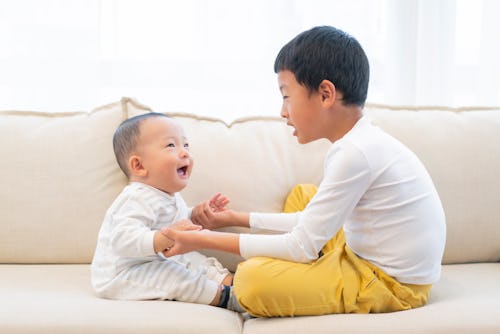
Having big kids and a baby at the same time is a balancing act — especially during cold and flu season when older kids are exposed to heaps of germs at school. You want to keep your baby safe, but should you separate your baby from your germ-ridden kids? Is there a better way to protect your baby from illness? Here’s what experts have to say about when an older sibling is sick around a newborn and how to keep your little one healthy.
Should I keep my newborn away from sick siblings?
When one kid in your home gets sick, it is almost inevitable that your entire family will experience a wave of sniffling, coughing, and general ickiness. Babies are especially vulnerable to germs, and your gut instinct might be to keep them away from your big kids. While this could help prevent the spread of sickness, it is not a fail-safe solution.
"It's impossible to completely prevent the youngest siblings from catching an illness, even with our best intentions," Dr. Natasha Burgert, MD, FAAP, a pediatrician in Overland Park, Kansas, tells Romper. "I remind my families that the youngest child is always going to be the 'sickest' due to the hugs and kisses that are bound to come from older siblings."
Of course, keeping your little ones away from very sick older siblings as best you can is recommended. "For newborns (under three months of age), it’s best to really keep sick or potential sick contacts away from baby,” pediatrician and parenting expert Dr. Jennifer Trachtenberg, a SpokesDoctor for the American Academy of Pediatrics, tells Romper. “This is because newborns are more susceptible to getting sick and for more severe complications as their immune system is still developing.”
As for when to enact that separation, your kids will be most contagious when they are experiencing symptoms and will continue to spread germs even a day after they start feeling better. "As a general rule of thumb, kids are considered contagious until 24 hours fever-free. Keeping kids separated does help stop some of the continued spread of illness through a family," Dr. Burgert says. "Keep in mind, however, any person can be contagious with many illnesses before they start to appear sick. ... Common sense rules always apply."
How to keep your baby from getting sick from a sibling

Any time a kid is sick it’s not ideal, especially to anyone with a baby at home, but there are ways to make sure your kids spread the least amount of germs possible. Even if your big kids aren't sick (yet), they can still drag germs home from school or basketball practice that your baby may be especially susceptible to. Since it is nearly impossible to keep your baby and your older kids 100% separate, doctors recommend taking extra precautions with your older children in order to prevent the spread of these germs.
"Especially when babies are at home, I do recommend that kids come home from school and at minimum wash their hands and change into 'play clothes' at home. This helps to decrease the spread of germs on hands and clothes that come home from school," Dr. Burgert says. "Some of my families change the night routine to include bath [or] shower time after school instead of right before bedtime to accomplish this goal."
In addition to following precautions like hand washing and changing clothes after school, another recommendation for how to keep babies protected, according to Dr. Jen, is to make sure all children over the age of six months receive a flu vaccine. It will help protect them and their younger siblings in the home who may not be old enough for the flu shot.
But is an all-out separation ever necessary? "Whenever possible, it’s best to keep an older sibling with the flu, for example, away from baby as these germs are mainly spread by coughing, sneezing, or droplets that landed on hard surfaces where the germs live longer,” Dr. Jen says. “Because young newborns are not mobile, it may be easiest to keep baby quarantined in nursery or their parents' bedroom away from sick contacts. If a sick child is older, they may just want to stay in their own room away from baby."
Additionally, she recommends disinfecting surfaces in your home that multiple kids may come into contact with. "Disinfectant sprays or wipes can be used on high-use surfaces such as phones and remotes, and always make sure to wash your own hands when going from sick child to the baby," says Dr. Jen. So it's a good idea to stock up on soap and disinfectant well before anyone gets sick.
All in all, the best way to prevent your older kid from getting your baby sick is to be mindful about the spread of germs. You won’t be able to completely safeguard your newborn from sicknesses all of the time — that’s an unavoidable part of living with a family, as well as your little one developing their immune system. It’s inevitable that those in your household — adults, kids, newborns — will get sick every once in a while. However, you can do your best by taking precautions as ways to prevent the spread of germs, such as disinfecting surfaces, getting flu shots, teaching your kids proper hygiene, and making sure everyone eats a healthy diet.
Experts:
Dr. Natasha Burgert, M.D., FAAP, pediatrician in Overland Park, KS who writes at KCKidsDoc.com
Dr. Jennifer Trachtenberg, pediatrician and assistant clinical professor of pediatrics at The Icahn School of Medicine at Mount Sinai
0 comments:
Post a Comment